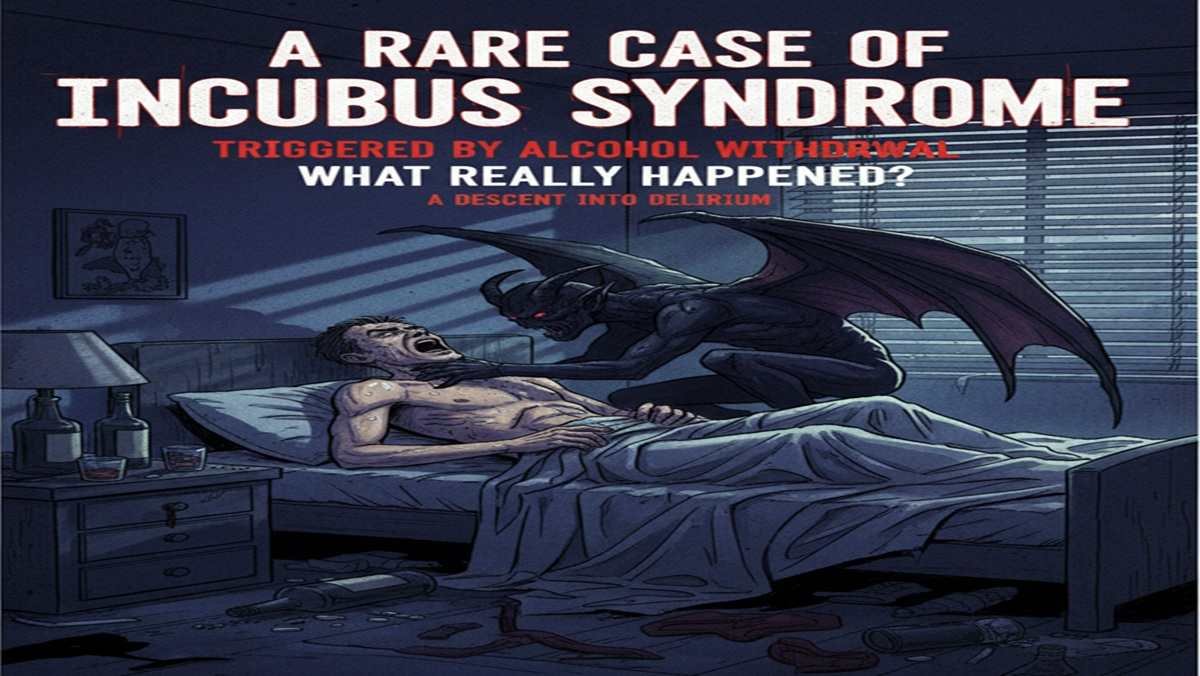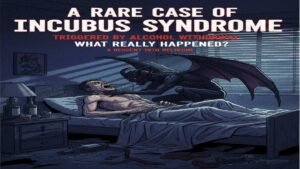We’ve all heard spooky stories about sleep demons or ghosts visiting people at night—but what happens when those “visits” feel frighteningly real? Recently, psychiatrists in India documented a rare and deeply unsettling case of Incubus Syndrome—a condition where a person believes they’re being sexually approached or attacked by a supernatural entity. What makes this case even more fascinating is that it was triggered by alcohol withdrawal.
The case, published in The Primary Care Companion for CNS Disorders, involved a 36-year-old man with a long history of alcohol dependence. After cutting down on his heavy drinking, he began experiencing vivid and terrifying hallucinations. He described seeing women in black who would “communicate” through vibrations in his fingers and approach him at night—sometimes sexually, sometimes with threats. Imagine the confusion and fear that must have caused.
At first, the experiences seemed pleasurable to him, but they soon turned dark. The figures reportedly warned him, “We will take you to the deathbed.” That’s when he sought help.
Table of Contents
ToggleWhat Exactly Is Incubus Syndrome?
Incubus Syndrome is a rare psychological and sleep-related disorder where people experience sexual hallucinations or sensations of being attacked by an invisible presence, often during the transition between sleep and wakefulness. The term incubus comes from Latin, meaning “to lie upon,” and originates from ancient myths about male demons that would assault women in their sleep.
In modern psychology, however, it’s understood as a parasomnia—a disorder involving abnormal experiences during sleep. It’s believed to occur when elements of REM (rapid eye movement) sleep, where most dreaming happens, intrude into wakefulness. This creates dream-like visions, sounds, and sensations that feel terrifyingly real.
The Man Behind the Case
In this particular case, the patient was a 36-year-old man who had been drinking half a liter of brandy every day. When he suddenly reduced his alcohol intake, his body went into withdrawal. Soon after, he began seeing and feeling ghostly female figures who communicated with him through strange “vibrations.” He even created an alphabet chart to decode their messages.
These hallucinations weren’t limited to one sense—he saw, heard, and felt them. Eventually, they became aggressive, which pushed him to seek medical help.
What Did Doctors Find?
Upon evaluation, psychiatrists discovered that he was suffering from an alcohol-induced psychotic disorder, not schizophrenia or classic sleep paralysis. He was fully conscious, oriented, and aware that something unusual was happening—what’s known as partial insight.
CT scans of his brain were normal, but his liver enzymes were slightly elevated, a common finding in long-term alcohol users. With benzodiazepines to safely manage withdrawal symptoms and supportive therapy, his hallucinations disappeared within days. His doctors also educated his family to prevent relapse and help him stay sober.
Why Does It Happen?
Research suggests that Incubus Syndrome may arise from a mix of factors—disrupted sleep cycles, substance use, stress, and strong cultural or religious beliefs. A 2022 study found that about 9–12% of people, including university students, report having at least one such experience in their lifetime. Those from non-Western cultures, where the concept of sleep demons is more familiar, tend to describe the episodes more vividly.
In short, what feels supernatural is actually the mind and body misfiring under extreme stress.
The Takeaway
This unusual case reminds us how deeply interconnected our mental health and physical habits are. Alcohol, sleep, stress, and culture all influence how our brains perceive reality. While the term “Incubus” may sound like folklore, it’s a real psychological phenomenon—and, thankfully, treatable with the right care.
If you or someone you know experiences hallucinations, sleep paralysis, or similar symptoms, it’s important to reach out to a mental health professional.
Read Also:









